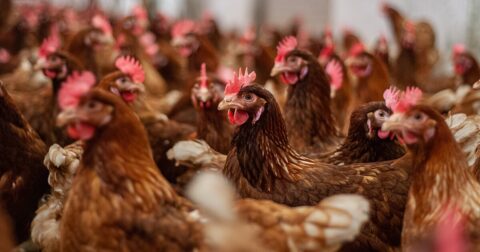Feature
Dairy and Meat Industries Push for Access to H-2A Farmworkers While the Trump Administration Slashes Their Pay
Policy•13 min read
Perspective
The legal system hasn't simply failed farmed animals—it has actively and methodically facilitated their exploitation. Here's what needs to change.


Words by Delcianna Winders
By now it has become common knowledge—at least within animal protection circles—that legal protections for farmed animals are woefully lacking. Circumnavigating this failure of our legal system, animal advocates have turned to corporate campaigns and the marketing of alternatives to animal products, with tremendous success. And yet, even as markets for plant-based meats and other alternatives are thriving, we are consuming more animals per capita than ever before. If we are to reverse this trend—and its grievous animal, human, and environmental impacts—we need to stop giving special legal treatment to animal agriculture.
For decades, industrial animal agriculture has benefited from a hands-off approach in nearly every area of the law, at every level of government. The U.S. Constitution is supposed to ensure equal protection for all under the law, yet the small handful of multi-billion dollar, multinational corporations that operate factory farms are given more protection than virtually anyone else. They are shielded from civil liability by state right-to-farm laws and from criminal liability by exemptions in most state cruelty laws. They’ve been awarded special treatment under environmental, worker safety, and myriad other laws as well. This preferential treatment effectively subsidizes these giant corporations, allowing them to line their pockets even more, continually reinforcing a massively uneven playing field.
These days businesses of every stripe are subject to routine government inspections for compliance with minimum standards and risk losing their licenses if they fail. Yet despite their enormity, and the serious animal welfare, worker and consumer safety, and environmental risks they pose, factory farms are given a free pass.
There is not a single federal law governing the on-farm treatment of animals raised for food. Indeed, the federal Animal Welfare Act, which provides minimum protections for animals exploited for other purposes, such as experimentation, entertainment, and the pet trade, specifically excludes farmed animals from the very definition of “animal.” And while mammals used for food have at least some minimal—though poorly enforced—legal protections at slaughter and during transport, the U.S. Department of Agriculture, the federal agency Congress tasked with enforcing these protections, has refused to apply them to chickens and other birds, who comprise the vast majority of land animals used for food—to say nothing of aquatic animals.
States, in turn, have failed to fill the regulatory void left by the lack of federal oversight. And when nongovernmental organizations dedicate their limited resources to trying to shed light on the reality inside the crowded, dark, filthy warehouses supplying our food through investigations, rather than addressing the cruelty they expose, factory farms go crying to the legislature about the exposure, seeking yet more special legal treatment, in the form of ag-gag laws.
In short, our laws haven’t simply failed farmed animals and the other vulnerable beings harmed by industrial animal agriculture—they have actively and methodically facilitated their exploitation. Until we dismantle this regime of legal exceptionalism, our ability to hold factory farms accountable will remain limited.
That’s why I’ve dedicated my career to changing the law for animals—and to training law students to do so.
Corporate campaigns are important. Alternatives to animal products are important. But they alone won’t save us, or the animals, from an industry that is propped up by an intricate scaffolding of special interest legal carveouts and benefits—a scaffolding that, among other things, makes it too easy for it to renege on corporate commitments and gives it unfair advantages over more humane and environmentally friendly alternatives.
There are cracks in the armor already. In January, California and Massachusetts laws prohibiting the sale of products from the cruelest forms of factory farm confinement will go into effect. These laws are truly modest—they require that food in these states be sourced from animals who were able to stand up, lie down, and turn around during their short lives. Yet rather than taking advantage of generous phase-in periods to come into compliance, the industry spent millions of dollars whining to the courts about having to begin extending even a modicum of humanity to the pigs they profit from.
After decades of special legal treatment, it’s little wonder the spoiled industry is wailing. But our work is just beginning.